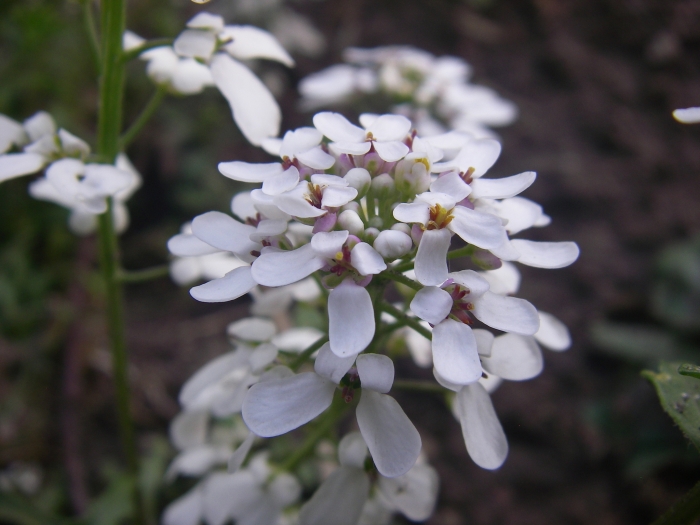Wild Candytuft
(Iberis amara)
Wild Candytuft (Iberis amara)
/
/

© purperlibel
CC BY-SA 4.0
Image By:
© purperlibel
Recorded By:
Copyright:
CC BY-SA 4.0
Copyright Notice:
Photo by: © purperlibel | License Type: CC BY-SA 4.0 | License URL: http://creativecommons.org/licenses/by-sa/4.0/ | Uploader: purperlibel | Publisher: iNaturalist |

























Estimated Native Range
Summary
Iberis amara, commonly known as wild candytuft or bitter candytuft, is an annual herb native to the limestone soils of the Mediterranean region, including Southern Europe and Northern Africa. It typically grows to a height of 4-12 inches (10-30 cm) and is characterized by its narrow, lance-shaped leaves and clusters of white or pale violet flowers that form a lax racemose corymb. The flowering season occurs in late spring to early summer, and the flowers are known for their delicate beauty rather than showiness.
Wild candytuft is valued for its compact size and attractive flowers, making it a popular choice for rock gardens, borders, and as a ground cover in sunny areas. It thrives in well-drained, alkaline soils and requires full sun exposure to flourish. While it is drought-tolerant once established, it benefits from regular watering during prolonged dry periods. In cultivation, it is relatively low-maintenance, but it can suffer from root rot if overwatered or planted in poorly draining soils. It is not known to be invasive when grown outside its native range, but gardeners should be mindful of its potential to spread in favorable conditions.CC BY-SA 4.0
Wild candytuft is valued for its compact size and attractive flowers, making it a popular choice for rock gardens, borders, and as a ground cover in sunny areas. It thrives in well-drained, alkaline soils and requires full sun exposure to flourish. While it is drought-tolerant once established, it benefits from regular watering during prolonged dry periods. In cultivation, it is relatively low-maintenance, but it can suffer from root rot if overwatered or planted in poorly draining soils. It is not known to be invasive when grown outside its native range, but gardeners should be mindful of its potential to spread in favorable conditions.CC BY-SA 4.0
Plant Description
- Plant Type: Herb
- Height: 0.5-1 feet
- Width: 0.5-1 feet
- Growth Rate: Moderate, Rapid
- Flower Color: Pink
- Flowering Season: Summer
- Leaf Retention:
Growth Requirements
- Sun: Full Sun
- Water: Low
- Drainage: Medium
Common Uses
Border Plant, Butterfly Garden, Deer Resistant, Drought Tolerant, Groundcover, Low Maintenance
Natural Habitat
Native to limestone soils of the Mediterranean region, including Southern Europe and Northern Africa
Other Names
Common Names: Rocket Candytuft, Wild Candytuft, Gruetzblume, Bitter Candytuft
Scientific Names: , Iberis amara, Biauricula amara, Biauricula panduriformis, Biauricula resedifolia, Biauricularia amara, Biauricularia panduriformis, Biauricularia resedifolia, Crucifera iberis, Iberis affinis
GBIF Accepted Name: